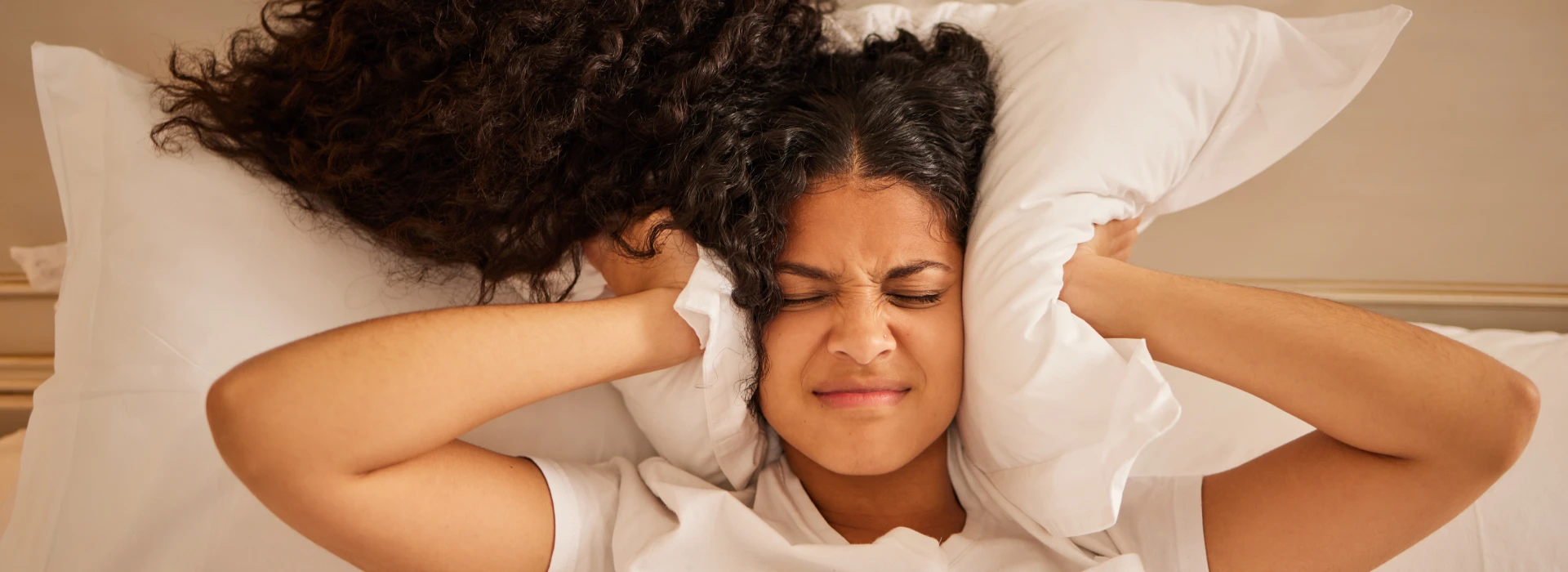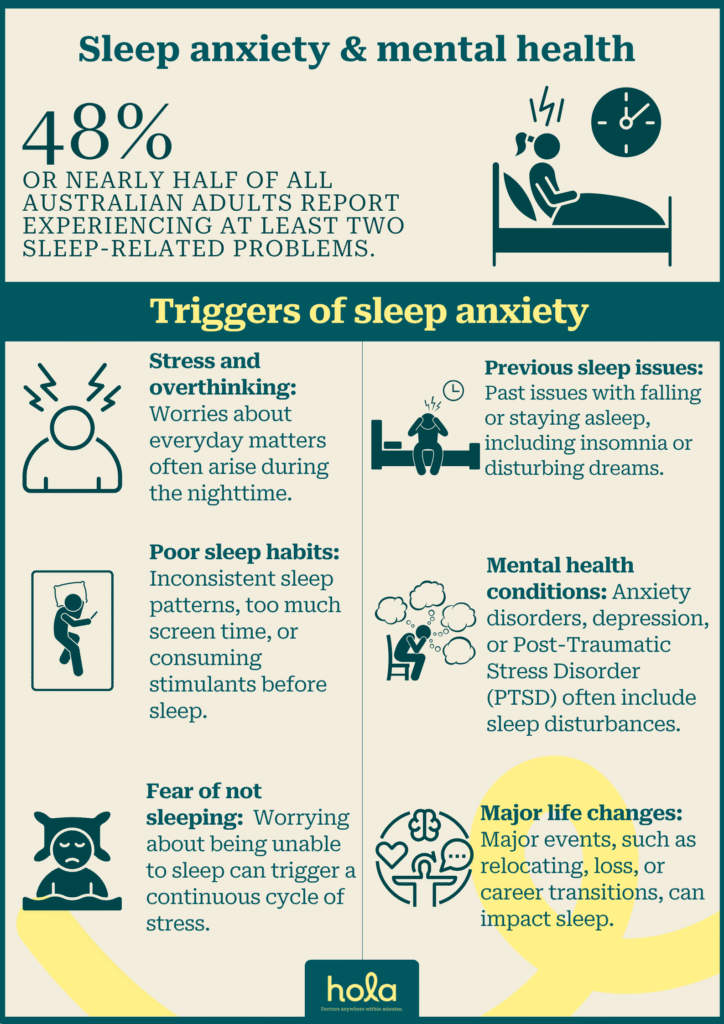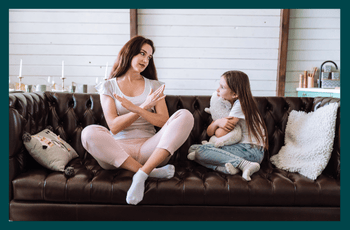Sleep anxiety & its impact on mental health
Written by editorial staff writer at Hola. Medically reviewed by Amira Shah, MA in Counselling Psychology, Registered Psychotherapist.

Contents

What is sleep anxiety?
Sleep anxiety is more than insomnia. It often creates a vicious cycle – worry about sleep, difficulty sleeping, increased anxiety about sleep- repeat. Also read: What are the Most Common Causes of Sleep Disturbance?Ready for positive change? Start your mental health care plan here.
What does sleep anxiety feel like?
Sleep anxiety can feel like a restless blend of worry and tension just before bedtime. You may experience emotional and physical symptoms, including:1. Emotional symptoms:
- Pre-sleep panic (“what if I can’t sleep tonight?”)
- Nighttime rumination (replaying conversations/events) Morning dread (anticipating another bad night) Irritability from chronic tiredness
2. Physical symptoms:
- Muscle tension (especially jaw, shoulders) Racing heart rate when trying to sleep Shallow breathing or cheat tightness restless body (constant repositioning)
What triggers sleep anxiety?
Sleep anxiety stems from multiple interconnected factors that create and sustain the sleep-worry cycle. The most common triggers include- Stress and overthinking: Worries about career, relationships, and everyday matters often arise during the nighttime.
- Poor sleep habits: Inconsistent sleep patterns, too much screen time, or consuming stimulants like caffeine before bedtime can disrupt sleep.
- Fear of not sleeping: Worrying about being unable to sleep can trigger a continuous cycle of stress.
- Previous sleep issues: Past issues with falling or staying asleep, including insomnia or disturbing dreams, may cause a sense of dread at night.
- Mental health conditions: Anxiety disorders, depression, or Post-Traumatic Stress Disorder (PTSD) often include sleep disturbances.
- Major life changes: Major events, such as relocating, loss, or career transitions, can impact sleep temporarily or over an extended period.

Somniphobia symptoms to recognise
Somniphobia (fear of sleep) is a specific phobia in which the individual experiences an intense fear of falling asleep. Symptoms include:1. Emotional symptoms:
- Extreme fear or anxiety at the thought of falling asleep
- Nighttime dread or reluctance to go to bed
- Constant worry about sleep-related circumstances or nightmares
- Feeling overwhelmed by the need to sleep, yet unable to unwind
2. Physical symptoms:
- Restlessness or trouble unwinding before sleep
- Increased heart rate or palpitations as bedtime approaches
- Shaking or trembling at the thought of sleep
- Perspiration or a feeling of tightness in the chest
- Sleep disturbances like insomnia or frequent awakenings throughout the night
How does sleep impact your mental health?
Sleep is vital for mental health. Sufficient restorative sleep helps stabilise mood, improve cognitive function, and manage stress. It strengthens emotional resilience, reduces anxiety and depression, and improves memory and decision-making skills. Conversely, poor sleep or sleep deprivation can worsen mental health, resulting in irritability, increased stress, anxiety, and a higher risk of developing depression.Do individuals vary in the amount of sleep they need?
Individuals require different amounts of sleep, which can be influenced by various factors such as age, genetics, lifestyle, and health status. While the typical recommendation for adults is between 7 to 9 hours of sleep each night, some may feel rejuvenated with slightly less, whereas others might require more to operate optimally. Children need 9-12 hours, teenagers 8-10 hours and older adults 7-8 hours on average. Aspects like stress, level of physical activity, and medical issues can also affect how much sleep a person needs.
Sleep requirements are not universally applicable. Paying attention to your body's signals and assessing how you feel during the day can help determine your ideal sleep duration.
How can I overcome sleep anxiety?
Sleep anxiety can create a cycle that prevents restful slumber. To combat this, begin by establishing a soothing bedtime routine. Engage in activities such as reading, gentle stretching, or 4-7-8 breathing exercises to calm your mind and body before sleep. Refrain from screens at least 1 hour before bed, caffeine after 2pm, and heavy meals in the evening, as these can heighten anxiety and disturb sleep patterns. Consider Cognitive behavioural therapy for insomnia (CBT-I) has proven to be one of the most effective remedies. It aids in shifting negative perceptions about sleep and developing better sleeping practices. Maintaining a regular sleep schedule with no more than 1 hours variation on weekends.
With appropriate strategies and support, sleep anxiety can be effectively managed, allowing for more restful nights and enhanced overall well-being.
How can I prevent sleep anxiety?
Sleep anxiety can perpetuate a cycle that hinders your ability to sleep. To address it, establish a relaxing pre-sleep routine. Consider engaging in calming activities such as reading, gentle stretches, or breathing exercises to prepare your mind and body for rest. Limit screen exposure, caffeine, and heavy meals in the evening, as these can exacerbate anxiety and disrupt your ability to sleep. Cognitive behavioural therapy for insomnia (CBT-I) stands out as one of the most effective solutions. It assists in reframing negative thoughts associated with sleep and fosters healthier sleeping habits. For best results, try implementing these strategies consistently for at least 4 weeks.
Sleep anxiety can be effectively managed by employing the right strategies and resources. This can promote restful nights and enhance overall well-being.
Tips for creating healthy sleep habits and improving sleep
Preventing sleep anxiety involves cultivating healthy sleep practices and creating a serene atmosphere that encourages relaxation. Adhere to a regular sleep routine by going to bed and waking at the same time every day, even on weekends. This approach regulates your body's internal clock and lessens bedtime-related stress. Design a calming pre-bedtime routine, such as enjoying a warm shower, listening to relaxing music, or practising deep breathing. Reduce screen time at least one hour prior to sleep, as blue light can disrupt melatonin production. Steer clear of stimulants such as caffeine and alcohol in the evening, and ensure your sleeping area is comfortable, quiet, and dark.
Psychotherapist Amira Shah mentions - The ideal sleep environment is cool (around 18-20 degree C) completely dark, and free from noise disruptions.
By emphasising consistent routines and tranquil habits, you can diminish the likelihood of sleep anxiety and experience more restful, worry-free nights.
Also read: Healthy Sleeping Habits: 9 Ways to Make Your Sleep Better
When to get support
Obtaining sufficient restorative sleep is vital for mental, emotional, and physical health. Here are some straightforward techniques to enhance your sleep quality:
- Follow a routine: To help regulate your body clock, retire to bed and wake up at the same time every day.
- Establish a calming bedtime routine: Wind down with soothing activities like reading or deep breathing.
- Enhance your sleep environment: Maintain a cool, quiet, dark, and comfortable bedroom.
- Minimise stimulants: Avoid caffeine, alcohol, and heavy meals before going to bed.
- Stay active: Regular physical activity promotes better sleep, but refrain from intense workouts late in the evening.
Implementing small, steady adjustments to your nightly practices can yield deeper, more restorative sleep over time. If sleep problems persist beyond 3-4 weeks, consider seeking professional help.
Where to get support
If you are experiencing difficulties with sleep or facing mental health issues that impact your daily routine, seeking help can significantly improve your situation. Begin by consulting your general practitioner, who can evaluate your symptoms and refer you to a specialist if necessary. Additionally, you should reach out to a psychologist or sleep therapist for personalised approaches. For convenient and accessible care, Hola Health provides online consultations, prescriptions, and mental health treatment plans (MHTP). Through MHTPs, you can obtain a systematic method for addressing sleep and emotional well-being, directed by professionals from the comfort of your own home. Don’t hesitate—assistance is available when you need it the most.
Sleep anxiety isn’t just a poor night’s sleep—it’s a barrier to poor mental health. However, with the right strategies, like better sleep habits and relaxation methods, it's possible to break the pattern and enjoy peaceful nights again. Once you take charge of your sleep, you’ll be moving toward a healthier, more energised mind.
Take control of your mental health. Begin your care plan now.
What we treat
- Cough
- Nausea & vomiting
- Fever
- Hayfever
- Fatigue
- Sore throat
- Acne
- Hair loss
- Gout
- Eczema
- Rosacea
- Sunburn
- UTI
- Erectile dysfunction
- Contraception
- Morning sickness
- Morning after pill
- Prostate health
- Anxiety
- Depression
- Stress
- Grief & loss
- Antidepressants
- Premature ejaculation
- Asthma
- Blood pressure
- Blood thinners
- Diabetes
- Cholesterol
- Migraines & headaches
- Allergies
- Body ache
- Heartburn & reflux
- Sleep disorder
- Pain relief
- Gastro
Related Articles
Disclaimer
This blog is for general informational purposes only and does not indicate that Hola Health provides all treatments or preventive measures mentioned. It is not intended to be a substitute for professional medical advice. Always seek the guidance of your doctor or other qualified health professional with any questions you may have regarding your health or a medical condition. For emergencies please immediately contact 000. Any medical topics discussed are intended to educate, not to imply availability through Hola Health.

Get affordable healthcare on your terms, with quick access to qualified, Australian-registered telehealth doctors & health practitioners, 24/7, 365 days a year. No more searching for ‘doctors near me‘ – Hola connects you instantly.
Address: 79 St Georges Terrace, Perth WA 6000


Hola Health App
Get affordable healthcare on your terms, with quick access to qualified, Australian-registered telehealth doctors & health practitioners, 24/7, 365 days a year. No more searching for ‘doctors near me‘ – Hola connects you instantly.
Call 000 for emergency or urgent medical help.
Address: 79 St Georges Terrace, Perth WA 6000
© Hola Health, a brand of Packapill Pvt Ltd


 Facebook
Facebook  X
X  Copy Link
Copy Link











